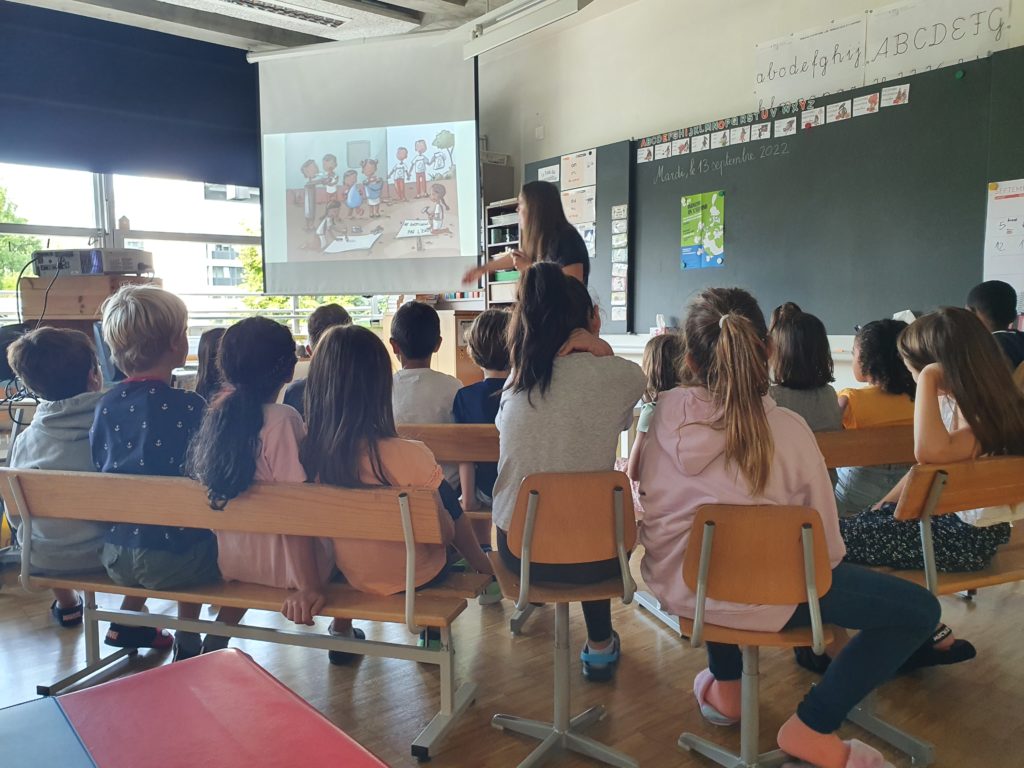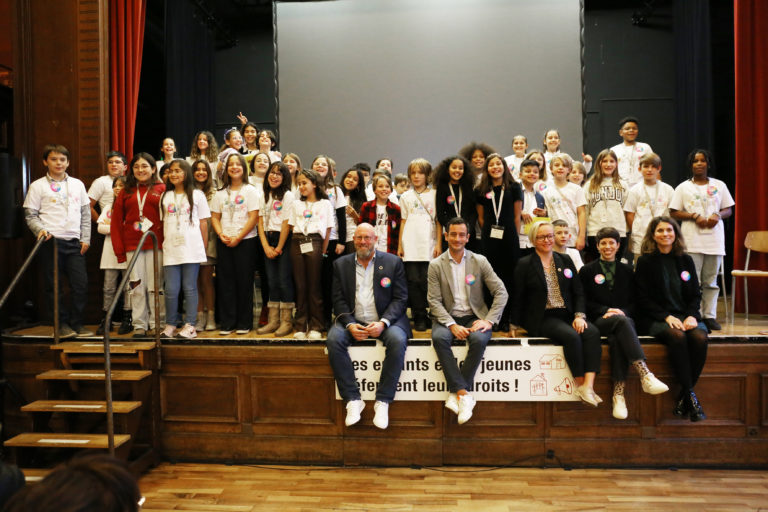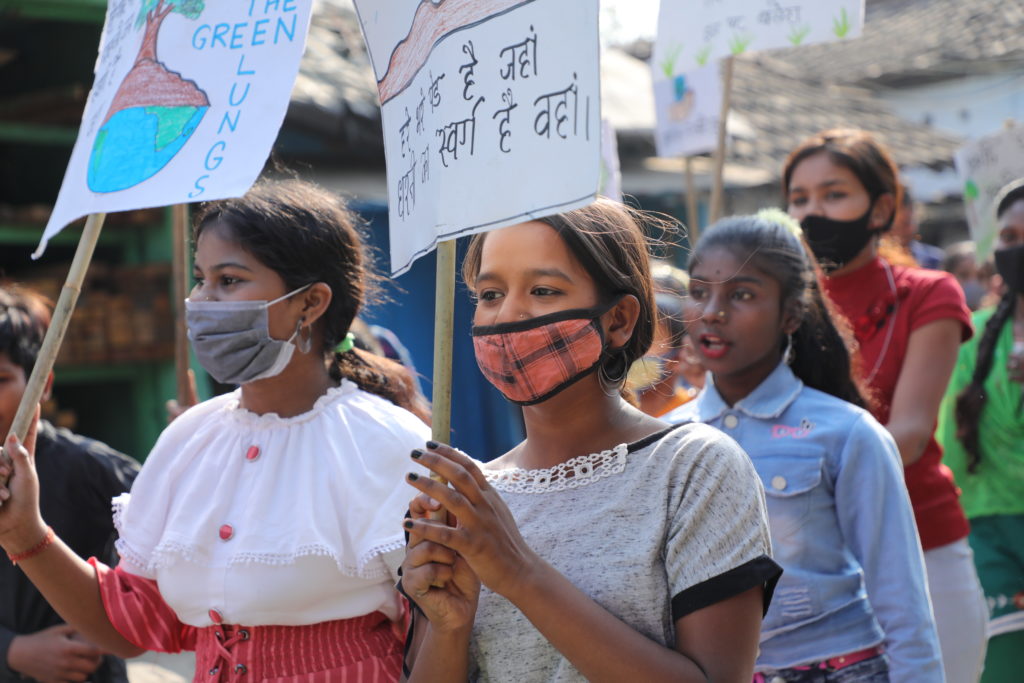Lisa Wiedemann has recently joined the team of Terre des Hommes Switzerland as a program officer in Switzerland. She tells us about her motivations and her first steps within the organization. Interview.
TdH Suisse : Lisa, can you tell us about your first experience in TdH Switzerland?
Thanks to my colleagues, I learned to “jump” a bit between the different actions we carry out here and there. All projects aim at strengthening the participation of children and young people: It is fascinating! This way they become visible and supportive actors able to defend their rights.
In concrete terms, I also wanted to understand how the projects are carried out. For example, in schools in Switzerland, the organization sets up animations on different themes related to children’s rights in order to sensitize students on the realities in the contexts where we work (India, West Africa and South America).
It is very interesting to see that the children question themselves a lot about their rights and the lives of other children in the world. They realize that they also have the capacity to act here. They also enjoy approaching these issues through innovative participatory games. I have also had the chance to participate in the March of Hope or to prepare the Children’s Conference with my colleagues. All these steps have allowed me to integrate well into the team.
Lisa Wiedemann (LW): “My first steps were mainly towards my colleagues. I wanted to find out about the projects in Switzerland and how they relate to the work in the other countries where TdH Switzerland works. I wanted to understand how the team organizes very diverse projects around the world while answering common questions and a global strategy.
Thanks to my colleagues, I learned to “jump” a bit between the different actions we carry out here and there. All projects aim at strengthening the participation of children and young people: It is fascinating! This way they become visible and supportive actors able to defend their rights.
In concrete terms, I also wanted to understand how the projects are carried out. For example, in schools in Switzerland, the organization sets up animations on different themes related to children’s rights in order to sensitize students on the realities in the contexts where we work (India, West Africa and South America).
It is very interesting to see that the children question themselves a lot about their rights and the lives of other children in the world. They realize that they also have the capacity to act here. They also enjoy approaching these issues through innovative participatory games. I have also had the chance to participate in the March of Hope or to prepare the Children’s Conference with my colleagues. All these steps have allowed me to integrate well into the team.

TdH Suisse : What is your working day like?
LW: At the moment, my work days are alternated between team meetings, coordination tasks, moments of reflection, reading. Not to mention the moments of sharing over coffee, allowing us to address issues more informally and quickly. There are exchanges with the whole TdH team helping us to move towards a global cohesion of our actions, and specific exchanges between the colleagues who run the projects here in Switzerland.
I was also able to organize meetings with our network partners here in Switzerland, especially those whose actions we have in common. The points related to education for sustainable development (ESD) in schools in Switzerland and the implementation of more participatory approaches such as project-based pedagogy are then highlighted.
TdH Suisse: How do you keep the strength, the energy, the commitment in your “stressful and difficult” daily life?
LW: What motivates me is above all the conviction to carry out actions that bring global meaning. If you are motivated, the energy comes naturally. This commitment is in line with my values. I like teamwork and the strength it can bring. So I don’t feel it as negative stress. It is true that sometimes I feel a little worried about my own children, for whom I then have less time and less energy at the end of the day. I reassure myself that I am also doing this work for them and to defend their rights.
TdH Suisse: You have just organized the 3rd French-speaking Children’s Conference, can you tell us more about it? What is your feeling?
LW: This project really puts child participation at the center and it’s exciting! The children themselves choose the topics they will work on for several days. They formulate their own recommendations in relation to the chosen topics and address the politicians directly.
I see this project as a huge learning opportunity, as it is not just a “conference”, but also the steps before and after the D-day. I am thinking of all those moments that are less visible but that are an integral part of the discovery of democracy and citizenship: the animations in the classes on the rights of children, the exchanges between classmates to agree on the themes, the voting of representatives… The social dimension is also key: these children, from different backgrounds, work together for several days even though they do not necessarily know each other. They are able to find a common language to write recommendations, understand and practice in different roles in order to be ready for a conference involving politicians.
The question of follow-up with politicians is also essential in this project: the “ambassadors for children’s rights”, as we call them, will also have the opportunity to meet politicians from the federal and cantonal levels. They can thus see the implementation of their recommendations. It is also a chance for politicians to meet and exchange with “politically savvy” children. I think it is important that politicians can formulate messages in a language that children understand. Our children, as citizens, are not always targeted as an audience in political communication and this is a shame.
Finally, let’s remember that this project could not exist without the financial support of the donors and without the enormous commitment of the young volunteers who supervise and accompany the children during their stay in the camp.


TdH Switzerland: What are the humanitarian issues of today and tomorrow? In Switzerland and internationally?
In Switzerland and internationally we are confronted with climate change. This has an impact on all areas of our lives. The climate crisis is linked to access, exploitation and distribution of resources. The stakes in terms of equity and equal access are also enormous: we can no longer guarantee equity and equality to natural resources for future generations. Our children will be the most affected.
The pandemic has clearly demonstrated that scientific models are not enough to predict human behavior in the face of a crisis. This is why I think that humanitarian issues here and internationally are very much linked to the management of societies in crisis. We need to create more resilient societies. In terms of children’s rights, it seems to me that the right to participation is one of the most endangered rights. It is extremely important to involve children in crisis management and not to forget them – as was the case during the Pandemic in many countries.
TdH Suisse : Do you have a final message for our donors?
LW: Donner quelque chose de soi, ce n’est pas qu’un don – c’est aussi une responsabilité envers l’autre. De plus, je pense que la solidarité est la base de notre cohésion sociale. S’engager pour que les droits des enfants soient respectés ici et là-bas, c’est alors garantir que cette cohésion s’inscrit dès maintenant dans notre quotidien. Les enfants sont certes les citoyens de demain mais surtout les citoyens d’aujourd’hui. En soutenant notre travail, vous vous adressez aux enfants dès aujourd’hui et vous contribuons à la construction du monde de demain, plus juste et plus résilients face aux crises.

